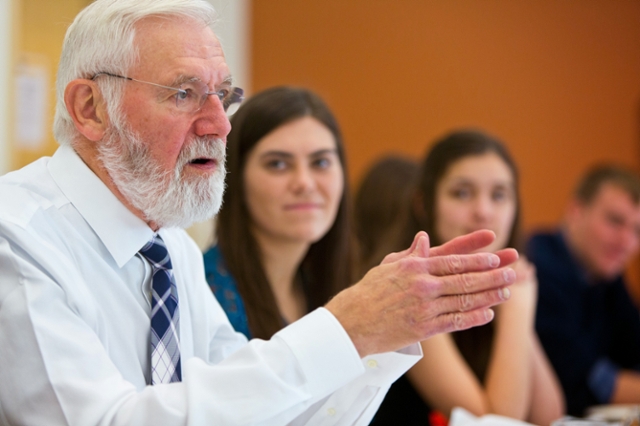Page 21 • (444 results in 0.058 seconds)
-
Click on the video above to watch a recording of the evening program.Thank you for your generous support for PLU!Kyle Siemers '20, Chemistry with Biochemistry EmphasisRegents’ Scholar, Admission Ambassador Student Coordinator “One thing that stood out to me the most while I was contemplating my college decision was how at some other schools when I mentioned I wanted to pursue studying medicine and science and still be involved in music, I was met with some averted glances or some passive
-
, think again! Though anthropology does look at stones and bones, it also examines the politics, medicine, kinship, art, and religion of various peoples and times. This makes the study of anthropology a complex task, for it requires an understanding of the basics from numerous disciplines such as geology, biology, art, and psychology. The four fields of anthropology are cultural anthropology, how people live in groups today, linguistics, the study of language, biological anthropology, the study of
Professor Bradford Andrews, ChairXavier Hall, Room 142 12180 Park Ave S Tacoma WA 98447 -
- Donovan Long``Hey, I live here!``: Parallax of the Medicine Creek Treaty, From Leschi to Billy Frank Jr.4:15-5:15 - Delilah McCarterThe Hypocritical Oath: Reckoning with Racial Inferiority in the Nazi Typhus Experiments and the Tuskegee Syphilis Experiments in the United States5:15-5:45 - Kara AtkinsonThe Smoke of Law and Democracy: Settler Colonialism and Lawfare in Israel and the Occupied Palestinian TerritoriesMay 9, 20233:45-4:15 - Venice Jakowchuk4:15-4:45 - Franklin Brogan4:45-5:15 - Sam Zielke5
-
presentation is titled “Makah Voices and the Sea” and will be related to his award-winning book, “The Sea is my Country”. We are looking forward to your attendance this yearThis lecture is being held amidst many notable anniversaries. 2024 is the: 170th anniversary of Medicine Creek Treaty 100th anniversary of the Native American Voting Rights Act 20th anniversary of the exoneration of Chief Leschi 50th anniversary of Boldt Decision 100th anniversary of Nisqually Historian and PLU alumna Cecelia Svinth
-
Medical College Admission TestThe Medical College Admission Test (MCAT) is a standardized, multiple-choice examination designed to assess the examinee’s problem solving, critical thinking, and knowledge of science concepts and principles prerequisite to the study of medicine. Almost all U.S. medical schools require applicants to submit MCAT exam scores. Many schools do not accept MCAT exam scores that are more than three years old. The MCAT includes four (4) major test sections: Molecular
-
Medical College Admission TestThe Medical College Admission Test (MCAT) is a standardized, multiple-choice examination designed to assess the examinee’s problem solving, critical thinking, and knowledge of science concepts and principles prerequisite to the study of medicine. Almost all U.S. medical schools require applicants to submit MCAT exam scores. Many schools do not accept MCAT exam scores that are more than three years old. The MCAT includes four (4) major test sections: Molecular
-
and the Graduate Program in Medical Anthropology, Co-Director of the MD/PhD Track in Medical Anthropology coordinated between UCSF and UC Berkeley, Co-Chair of the Berkeley Center for Social Medicine Bio: Seth M. Holmes has an M.D. from the UC San Francisco School of Medicine and a Ph.D. in Medical Anthropology from UC Berkeley and UC San Francisco. He is on faculty in the Division of Society and Environment and the Joint Program in Medical Anthropology at UC Berkeley. A cultural and medical
-
. She is currently enrolled at the University of Washington in the Ph.D. program at the College of Built Environment. Over the years she has earned several certifications in advanced herbal studies and has extensively researched the subject of historical and traditional food and medicine systems of the Coast Salish tribes of Western Washington. Her career began as faculty for Northwest Indian College and as a Cooperative Extension Agent for the Traditional Foods and Medicines Program. In 2009, she
-

: 170th anniversary of Medicine Creek Treaty 100th anniversary of the Native American Voting Rights Act 20th anniversary of the exoneration of Chief Leschi 50th anniversary of Boldt Decision 100th birthday of Nisqually historian and PLU alumna Cecelia Svinth CarpenterAbout the Lecture: The Walter C. Schnackenberg Memorial Lecture is named after Dr. Walter C. Schnackenberg (1917-1973), who graduated from Pacific Lutheran College in 1937. One of Dr. Schnackenbergs most frequently expressed wishes was
-

Program of the Centers for Disease Control and Prevention and was appointed director of the CDC in 1977. He graduated from PLU in 1957 and later received his medical degree from the University of Washington and his master’s degree in public health from Harvard University. He also holds honorary degrees from numerous institutions and was named a fellow of the London School of Tropical Medicine and Hygiene in 1997. He has written more than 125 professional publications. Of all the universities he
Do you have any feedback for us? If so, feel free to use our Feedback Form.


